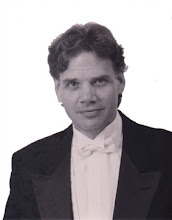I’m headed to Moscow in a few weeks to attend a special concert. On Tuesday, May 24, at Rachmaninov Concert Hall, a large choir from Moscow, together with choirs gathered from several other cities scattered across Russia, will perform Edward Scheve’s oratorio, The Death and Resurrection of Christ accompanied by a professional orchestra and with distinguished soloists under the direction of Oleg Romanenko. This concert marks the Russian premiere of a monumental work that was composed in Grinnell in 1908, when Edward Scheve (1865-1924) was on the faculty of Grinnell College. Through some strange quirks of fate, and due as well to the expressivity and beauty of the music, Edward Scheve’s oratorio became popular in Russia and Ukraine among members of the Baptist church – a minority denomination that has at times experienced great oppression in Russia. Musicians in the Baptist church sustained a passionate devotion to Scheve’s music through the many decades of the Soviet Union and afterward. Performances were accompanied by piano or in other arrangements, however, because they did not have access to the orchestral score. For all those decades, the only extant copy of the full orchestral score of Scheve’s oratorio was sitting in the Grinnell College archives virtually unnoticed.
Several years ago, having heard that Scheve had taught at Grinnell, an enterprising young conductor from Moscow named Oleg Romanenko contacted me by email asking about Scheve’s manuscript. I sent him a digital copy of the archival materials, and Romanenko went to work creating a modern, digitized version of the score and parts, with the original German text translated into Russian. Now, after much diligent work, Romanenko has succeeded in organizing a fittingly grand presentation of the complete work with the authorized orchestral parts. The impact of this project extends beyond this one concert, however: once they are made more widely available, these new orchestral materials will also facilitate future performances of the work in the US and worldwide. I was so struck by this story, with its unexpected intertwining of distant lives and communities, and by the concert organizers’ admirable artistic devotion, that I decided to travel to Moscow to meet with the musicians, to flesh out these intriguing historical links between Moscow and Grinnell, and to participate in the concert as a member of the choir.
Several years ago, having heard that Scheve had taught at Grinnell, an enterprising young conductor from Moscow named Oleg Romanenko contacted me by email asking about Scheve’s manuscript. I sent him a digital copy of the archival materials, and Romanenko went to work creating a modern, digitized version of the score and parts, with the original German text translated into Russian. Now, after much diligent work, Romanenko has succeeded in organizing a fittingly grand presentation of the complete work with the authorized orchestral parts. The impact of this project extends beyond this one concert, however: once they are made more widely available, these new orchestral materials will also facilitate future performances of the work in the US and worldwide. I was so struck by this story, with its unexpected intertwining of distant lives and communities, and by the concert organizers’ admirable artistic devotion, that I decided to travel to Moscow to meet with the musicians, to flesh out these intriguing historical links between Moscow and Grinnell, and to participate in the concert as a member of the choir.
Although this upcoming concert marks the Russian premiere, it will not be the European premiere. The Moscow concert is reminiscent of the work’s original European debut in Berlin in 1910, an ambitious event that received notice even across the Atlantic: the April 10, 1910 edition of The New York Times described a concert where Scheve, “Dean of the Music Faculty at Grinnell,” conducted Arthur Nikisch’s Berlin Philharmonic Orchestra, a chorus of 300 and a solo quartet in a performance of Scheve’s Passion—‘The Death and Resurrection of Christ.” It is hard to say why Grinnell College has, up until recently, paid relatively little notice to Edward Scheve as part of its heritage. In the early years of the 20th century, when Scheve was active, Grinnell College included a separate, thriving music conservatory. During the difficult years of World War II, the conservatory suffered, and it was eventually shut down. We could speculate that, when it disappeared, the Music Conservatory tended to fade in the college’s memory, and Edward Scheve with it, while other aspects of the college’s heritage were brought to the fore. Certainly, however, given his impressive achievements, Edward Scheve deserves attention as an important figure in the life of Grinnell College. Scheve’s obituary in the Grinnell Herald in 1924 spoke of him with warm reverence: “The magnitude of his genius is greater than any of us who were associated with him yet realize. He was a great teacher, a great organist, and a great composer. He made Grinnell musical, and any future history of the college and the town will number him among the real founders of Grinnell.”
Here is some information from the Rachmaninov
concert hall (in Russian).


